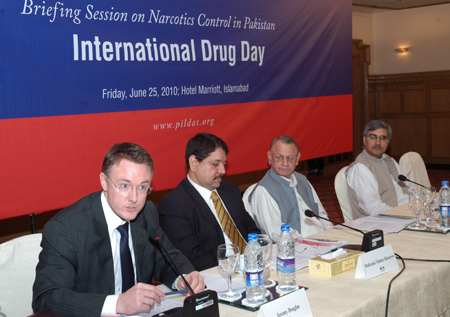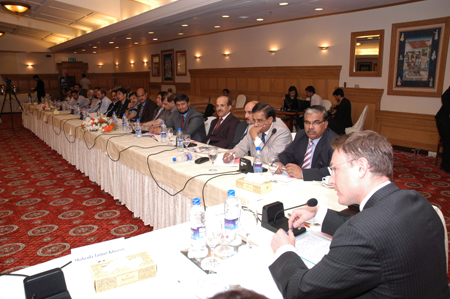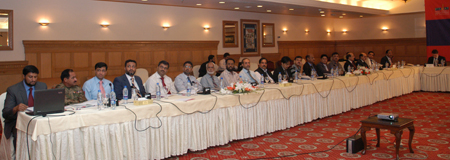|
|
| |
| EVENTS |
|
|
> �Pakistan sets exemplary achievements by highest seizures of Narcotics in the world� says Federal Minister for Narcotics Control, Pakistan
|
| |
|
Briefing on Narcotics Control
June 25, 2010
Hotel Marriott, Islamabad
|
|
| |
Islamabad, June 25; In order to mark the International Drug Day, PILDAT in association with the Ministry of Narcotics Control, Pakistan, organised a briefing session for a broad cross-section of the society at Islamabad. |
|
| |
Honourable Mr. Arbab Muhammad Zahir Khan, MNA, Federal Minister for Narcotics Control, Pakistan was the chief guest at the Session whereas other speakers who shared their perspectives at the session included Mr. Shahzada Taimur Khusrow, Joint Secretary, Ministry of Narcotics Control, Government of Pakistan; Mr. Jeremy Douglas, Representative- United Nations Office on Drugs and Crime (UNODC) Pakistan at Islamabad and Brigadier Sardar Mehmood, Director Enforcement, Headquarters, Anti Narcotics Force
|
|
| |
In his presidential address, the Federal Minister for Narcotics Control Mr. Arbab Muhammad Zahir Khan said that this day reminds us of our moral duty to save our near and dear ones from the curse of narcotic drugs. This day we will reinforce our resolve to help people who have unfortunately become drug addicts. This day also gives us a message to join hands with each other against this social evil which is gradually destroying our youth. He said that at this occasion we will resolve that we will cooperate with each other in our fight against the curse of narcotics drugs and create awareness among our masses. We commit that we will undertake efforts with full devotion and dedications to curb the menace of narcotics because this is the only way to get rid of this curse.Mr. Khan added that our country is in the neighborhood of Afghanistan which has assumed the status of a major drug producing country in the World. At present, it is producing almost 90% of the total world opium. According to an estimate 30% of the drugs are trafficked through Pakistan. During transition, these drugs are also consumed in the local market and, therefore, are a source of addiction in our country. We are victim country because of the Afghan opium production. The drug menace has social, health, and economic consequences for Pakistan, added the Federal Minister. The Federal Minister said that the Government of Pakistan being cognizant of this tremendous challenge has taken a number of steps to control this menace and the Ministry of Narcotics Control is actively engaged in many areas relating to Narcotics Control. He added that his Ministry has formulated a Five Year Drug Abuse Control Master Plan that provides a clear strategic roadmap where as the new National Anti Narcotics Policy 2010 designed to meet new challenges and international obligations and will soon be placed before the Cabinet. He added that the Ministry is progressing towards drug free Pakistan through a drug Free City and Drug Free Home. In this regard, Lahore city has been declared to be a Drug Free City. |
|
| |
Describing major efforts of the government, Federal Minister for Narcotics Control said that beside this Pakistan has a small Anti Narcotics Force with a total Strength of 2400 personnel yet its achievements are exemplary. Pakistan has the highest seizures in the world which has been appreciated by the international Community. Pakistan has maintained 1st or 2nd position on account of morphine/heroin seizers in the world since 2003-2004. Similarly, Pakistan has achieved 2nd and 3rd position in connection with opium seizures. Pakistan�s conviction rate is 87.15 % and we have frozen worth 56.80 million belonging to drug barons. Pakistan attained a poppy free country in year 2001. We are striving to regain this status very soon, added by the Federal Minister. The Federal Minister said that as Narcotics is a global problem, therefore, it can not be overcome without seeking cooperation with international community. Pakistan is playing a very effective role in all international forums. He said that we are cooperating against the menace of narcotics drugs as we are cooperating and coordinating with all law enforcement agencies of Pakistan. |
|
| |
Briefing about the Anti-Narcotics Policy of the Government of Pakistan, Mr. Shahzada Taimur Khusrow, Joint Secretary, Ministry of Narcotics Control, Government of Pakistan, said that the Anti Narcotics Policy 2010 continues to focus on the eradication of Narcotics and maintenance of Pakistan�s poppy-free status, but also places greater emphasis on coordination and cooperation among federal and provincial agencies and departments involved in Anti-Narcotics activities. Mr. Khusrow said that the policy seeks to enhance public participation in combating drug abuse, strengthen drug enforcement structures, and boost treatment and rehabilitation services. A drug-free Pakistan remains the ultimate goal, and while this may not be achieved in the short term, it is a goal Narcotics Ministry strives for in participation with the people of Pakistan, the region and the international community. |
|
| |
Talking about the Narcotics Trafficking from this region to Europe & beyond, Mr. Jeremy Douglas, Representative- United Nations Office on Drugs and Crime (UNODC) Pakistan said that Pakistan is critically placed in the international drug trade as it shares a 2, 430 km-long, porous border with Afghanistan, the world�s largest producer of illicit opium as well as with two of the most populous countries in the world. This means that law enforcement agencies face a two-fold challenge in interdiction � first, drugs exiting Afghanistan through Pakistan and second, precursors entering Afghanistan via Pakistan. Mr. Douglas said that more Afghan opiates pass through Pakistan than from any other country bordering Afghanistan. He said that the UNODC estimated that in 2009 approximately 30 per cent of Afghan opium and 40 per cent of Afghan heroin / morphine transited through Pakistan towards Iran, India, Africa, Europe, the USA, Canada, China and East / South East Asia. The trafficking is carried out through large shipments that enter Pakistan via the porous border area adjourning Afghanistan for onward movement to the West via Iran, the Mekran Coast, or Pakistan�s International airports. Smaller amounts are exported directly to consumer countries via airfreight, parcel post or courier and, although the scale of this is not established, �little and often� shipments are likely to be cumulatively significant, added by UNODC Representative. Mr. Douglas further added that Pakistan is a major transit source of precursors entering Afghanistan. He said that UNODC estimates that between 1.1 � 1.3 million liters of acetic anhydride may be required each for the production of Afghan heroin �much of which takes place on the boarder with Pakistan. There appear to be a range of major routes through the country, which particular concern for imports into Karachi and trafficking through Balochistan. Seizures are low but steadily increasing. Notable seizures include 14.8 tones in Karachi in 2008, 5 tones in Quetta in 2009 and 15 tones in Karachi in March 2010, shared by him. Mr. Douglas explained that whilst Afghan opiates are also consumed in Pakistan and are a significant public health challenges, Pakistan is primarily a transit country. The UNDOC now tentatively estimates that Pakistan is Africa�s main supplier of heroin at approximately 20 MT a year. Europe is a specially lucrative market for traffickers and an estimated 5 MT is shipped annually via direct connection through places like Islamabad airport and Karachi seaport. Currently, Pakistan�s efforts against the trafficking of Afghan Opiates (band the cultivation of opium poppy) are constrained by a law and order situation in boarder areas, which has monopolized the attention of Law enforcement agencies, like the ANF, our partner, he added. He said that this is a significant oversight as they estimate that the annual revenue generated by Afghan opiate trafficking to and through Pakistan exceeds US $ 1 billion. This does not include the revenue from illicit trading in associated precursors. This revenue has the possibility of benefiting organised crime groups along the major trafficking routes and the illegal economy spines off into another criminal justice challenge falling under UNODC mandates-money laundering. He believed that illicit drug trade undermines governance, institutions, societal cohesion and poses public health challenges, it also has an impact on the criminal justice from policing through prosecutions, courts where drug crimes dominate and prisons. Mr. Douglas believed that drug trafficker typically seek routes where the rule of law is weak. In turn, drug-related crime deepens vulnerability to instability and poverty. He said that in order to address the regional dimension of the drug challenges facing Pakistan today, UNODC has developed a rainbow strategy, which is a regional response to the threat posed by the supply, trafficking, and consumption of Afghan opiates. He explained that the strategy allows for constructive engagement with prime actors in the region, facilitates local ownership, and supplements interventions from national governments and other partners. Mr. Douglas said that that the government of Pakistan recently approved UNODC�s Country Programme for Pakistan 2010-2014, which has been developed in close consultation with government partners. He added that UNODC�s support in Pakistan is focused on three interdependent areas of work � (i) illicit trafficking and boarder Management, (ii) Criminal Justice, and (iii) drug demand reduction and HIV/AIDS. |
|
| |
Speaking at the briefing session about the performance of the Anti Narcotics Force, Pakistan (ANF), Brigadier Sardar Mehmood, Director Enforcement, Headquarters, ANF said that the Anti Narcotics Force is following the principles of common and shared responsibility. Pakistan takes stringent measures to check the flow of drugs to the rest of the world. The resultant achievements of Pakistan have been acclaimed and appreciated by the international community where Pakistan�s remarkable global standing in seizures of drugs since 45%3 are 1st in Heroin / Morphine, 2nd in Hashish and 3rd is Opium. He said that four significant seizures of precursors chemical since 45%8 include 15800 Kg AA (Acetic Anhydride � World Largest ever), 110%00 Kg AA , 4626 Kg AA and 10%00 Liters Acetyl Chloride. He added that Government of Pakistan pays special attention to prevent drug trafficking to Kingdom of Saudi Arabia (KSA) especially during Hajj where Anti Narcotics Force has been assigned the responsibility of checking 100% baggage of pilgrims proceeding to Kingdom of Saudi Arabia for Hajj since 45%0 and not a single case of Drugs trafficking has been reported on either side then. |
|
| |
Concluding the Briefing Session Mr. Ahmed Bilal Mehboob, Executive Director PILDAT, said that Narcotics Control remains a key issue in the country, especially its linkages with financing of terrorism and insurgency. He appreciated the support of the Ministry of Narcotics Control for facilitation of the Briefing. |
|
| |
|
|
| |
|
|
| |

|
|
| |
|
|
| |

|
|
| |
|
|
| |

|
|
|
|
|
|
|
|
|